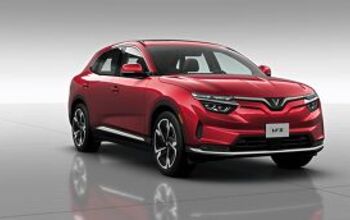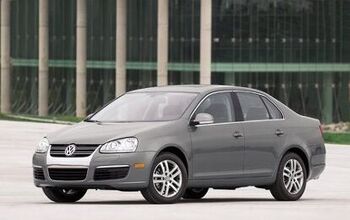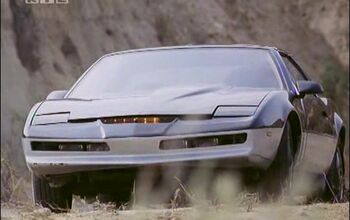QOTD: A Robot Car That Kills You?
Writing in the National Post, Matt Gurney discusses a darker side of autonomous cars, one that many people (especially this writer, who is not exactly familiar with the rational, linear type of operation that is involved with coding)
In a recent interview with PopSci, Patrick Lin, an associate philosophy professor and director of the Ethics + Emerging Sciences Group at California Polytechnic State University, proposed a hypothetical scenario that sums up the problem. You’re driving along in your robo-car, and your tire blows out. The computer in control rapidly concludes that your car is moving too quickly and has too much momentum to come to a safe stop, and there is traffic ahead. Since an accident is inevitable, the computer shifts from collision avoidance to collision mitigation, and concludes that the least destructive outcome is to steer your car to a catastrophic outcome — over a cliff, into a tree — and thus avoid a collision with another vehicle.
The raw numbers favour such an outcome. Loss of life and property is minimized — an objectively desirable outcome. But the downside is this: Your car just wrote you off and killed you to save someone else.
This situation, as Gurney writes, involves being a passenger in a device that is “…may be programmed, in certain circumstances, to write us off in order to save someone else?”
I’m not an expert on autonomous cars, or computer science, or robotics, or ethics, or government regulation. I am not going to go down the path of “people will never accept autonomous cars because driving is freedom”, because I just don’t think it’s true anymore.
But I do feel that autonomous cars represent something else: another techno-utopian initiative dreamed up by rational, linear thinking engineers that are incapable (sometimes biologically) of understanding the human and cultural intangibles that are an integral part of our existence. The idea of a coldly utilitarian device that would sacrifice human life based on a set of calculations is not something that will be well received. And the people behind self-driving cars may not understand this.
More by Derek Kreindler
Latest Car Reviews
Read moreLatest Product Reviews
Read moreRecent Comments
- Jkross22 Their bet to just buy an existing platform from GM rather than build it from the ground up seems like a smart move. Building an infrastructure for EVs at this point doesn't seem like a wise choice. Perhaps they'll slow walk the development hoping that the tides change over the next 5 years. They'll probably need a longer time horizon than that.
- Lou_BC Hard pass
- TheEndlessEnigma These cars were bought and hooned. This is a bomb waiting to go off in an owner's driveway.
- Kwik_Shift_Pro4X Thankfully I don't have to deal with GDI issues in my Frontier. These cleaners should do well for me if I win.
- Theflyersfan Serious answer time...Honda used to stand for excellence in auto engineering. Their first main claim to fame was the CVCC (we don't need a catalytic converter!) engine and it sent from there. Their suspensions, their VTEC engines, slick manual transmissions, even a stowing minivan seat, all theirs. But I think they've been coasting a bit lately. Yes, the Civic Type-R has a powerful small engine, but the Honda of old would have found a way to get more revs out of it and make it feel like an i-VTEC engine of old instead of any old turbo engine that can be found in a multitude of performance small cars. Their 1.5L turbo-4...well...have they ever figured out the oil dilution problems? Very un-Honda-like. Paint issues that still linger. Cheaper feeling interior trim. All things that fly in the face of what Honda once was. The only thing that they seem to have kept have been the sales staff that treat you with utter contempt for daring to walk into their inner sanctum and wanting a deal on something that isn't a bare-bones CR-V. So Honda, beat the rest of your Japanese and Korean rivals, and plug-in hybridize everything. If you want a relatively (in an engineering way) easy way to get ahead of the curve, raise the CAFE score, and have a major point to advertise, and be able to sell to those who can't plug in easily, sell them on something that will get, for example, 35% better mileage, plug in when you get a chance, and drives like a Honda. Bring back some of the engineering skills that Honda once stood for. And then start introducing a portfolio of EVs once people are more comfortable with the idea of plugging in. People seeing that they can easily use an EV for their daily errands with the gas engine never starting will eventually sell them on a future EV because that range anxiety will be lessened. The all EV leap is still a bridge too far, especially as recent sales numbers have shown. Baby steps. That's how you win people over.


































Comments
Join the conversation
As usual Derek puts zero thought into an article regurgitating somebody else's ideas. So here's the thing. Your robot driver is a worse driver than you. Your robot driver will always be a worse driver than you. In that need to decide what to do in a critical situation, the robot driver will be worse than you. But, 9 times out of 10 the robot driver won't be in that critical situation because it'll have been paying absolute attention to the environment around it, instead of stuffing around on facebook(Jack passim), daydreaming about the passenger, retuning the radio, eating a burger or falling asleep. Trains aren't safer than cars because traindrivers have mega driving skillz, they are safer because the operating environment has been linearized. Suppose your robot driver had an automatic override such that if there was a problem one mile ahead, its speed would drop to 45 mph, etc. It no longer needs to make last minute decisions, by the time the difficult decision has to be made, it can park instead of throwing you over a cliff.
It's so uplifting when people of faith find one another.